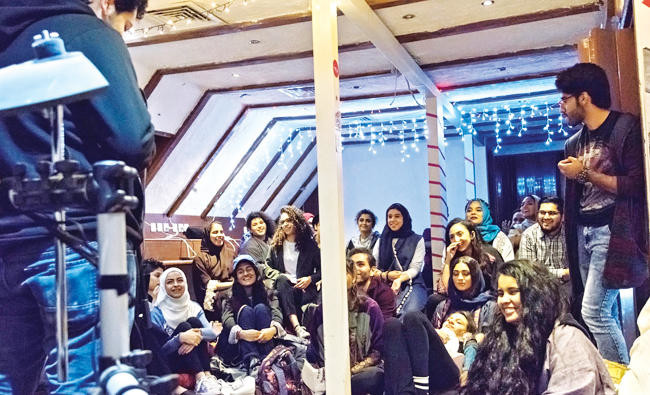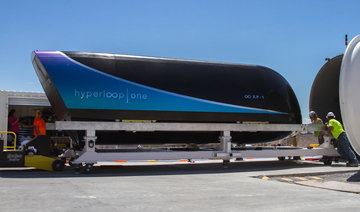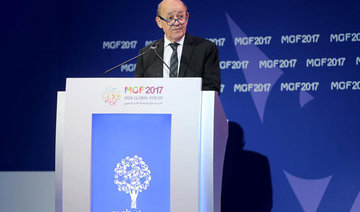JEDDAH: A group of young literature enthusiast gathered on Saturday morning in Humming Tree, a modern shared work space in Jeddah, to write about what the word “Motherland” meant to them, guided by literary prompts and sharing sessions that inspire writers to personalize their literary creations.
This was one of the Poetry Passport’s writing workshops, which have been a weekly occurrence since the inception of this local writing collective.
Dana Seif is the literary enthusiast behind the creation of the Poetry Passport. She explained that this initiative is writing collective, as well as a safe space for writers and artists to gain confidence by expressing themselves and sharing their work with an audience, but only if they wish to share their creations: “At the writers’ workshops, there is no pressure to share if you do not want to, which ensures that no one self-censors at the cost of sharing their work.”
The Poetry Passport was created in August 2017, as an online platform, as Dana explained: “I started by collecting poetry from people and filming them performing their literary creations, to then sharing the work on our website and social media accounts. Later on in October, I took a chance and hosted the very first writers’ workshop, by the end of October, the first Jeddah Spoken Word event was born.”
In Saudi Arabia, public initiatives that foster literary development are almost nonexistent. Growing up with this realization prompted Dana to create that outlet herself: “I grew up in Jeddah, a passionate writer with no outlet to share and learn. By the time I reached high school, I became aware of all the international writing collectives out there. I followed Button Poetry, Slamfind, and a bunch of other YouTube channels that posted spoken word videos often, and fell in love. I later moved to Lebanon for university education and by my last year there, I was immersed in the art culture in Beirut. There were several writing collectives: Yafta, The Poetry Pot, Documented Experiences, and more. I left Beirut with a heavy heart. So when I returned to Jeddah, I decided to start my own writing collective, and so was the Poetry Passport born.”
On what goes into the preparation of each workshop, she said: “I have to decide on a topic, then design the poster. I do illustrations for many of my posters, create the social media content, promote it daily, email everyone on my database about it, save spots, manage to not overbook, while bearing in mind last minute cancelations, research the topic itself to have a thorough idea about it, come up with questions that align with it, often philosophical ones, create the writing workouts and applying them on myself, booking the space and making sure everything is ready for the session.”
“We also have a range of events that foster creative expression such as Jeddah Spoken Word; a monthly event that includes a line-up, band, and open mic. This is the only event where tickets are sold ahead of the event rather than on the door. Another event is Spoken Word Screening, where I screen a selected number of spoken word poetry and then open them up for discussion and analysis.”
The Poetry Passport’s core mandate is making literary development accessible to enthusiast irrespective of their socioeconomic status, this is reflected in the low fees for attending their workshops and various events. Dana commented on this: “Many of our regulars are students or recent graduates, still unemployed. Several people have urged me to increase the fees, but the more I spend Saturdays listening to people’s stories, the more I know that in the current economic state, many people will be unable to attend, at least not regularly. I’ve changed venues in the past in search of ways to cut costs, rather than increase the fees. Every session costs me around SR250 in rent, as well as a monthly fee of SR600 to be able to rent the space.”
The Poetry Passport’s activities are funded through ticketing which currently poses an obstacle to the founders: “Breaking even means I cannot afford to take a chance on new ideas for The Poetry Passport at the current time. One project that I’ve been thinking about for some time now, is low-cost zines of different writings by members as a writing collection.”
“The support of those who care about art and education is really important. You can donate by sponsoring our membership at Humming Tree, or by donating space for us to host some of our sessions and events. Also, you can support us by purchasing some of our merchandize.”
On what is in store for the Poetry Passport, Dana shared plans to see this initiative spreading throughout the Arab region: “I have a vision for the Poetry Passport to spread to different Saudi cities, then to Beirut, Saida, Amman, and others. This is a long-term plan, but one I am working eagerly toward achieving.”
Saudi youth fostering literary development in Jeddah
Saudi youth fostering literary development in Jeddah

Saudi Interior Ministry confirms ban on transferring or publishing security surveillance camera recordings

- Anyone who violates the rule will be punished with a fine of SR20,000 ($5,327), interior ministry says
RIYADH: Saudi Arabia’s Interior Ministry confirmed that the provisions of the “Use of Security Surveillance Cameras” law prohibit the transfer or publication of security surveillance camera recordings.
Security surveillance camera recordings can only be transferred or published with the approval of the ministry or the Presidency of State Security, based on a judicial order, or at the request of an investigating authority.
The ministry explained that anyone who violates this rule will be punished with a fine of SR20,000 ($5,327).
This includes anyone who transfers or publishes recordings in violation of the law or damages or vandalizes security surveillance camera systems or recordings.
Saudi artist breaks from signature style with ‘W’ard’ exhibition

- Dammam collection running until Jan. 10 features sculpture, video and imagery
DHAHRAN: Visitors are immersing themselves in a vibrant celebration of art as Hussain Alismail unveils his compelling solo exhibition, “W’ard,” at the SASCA Art Gallery in Dammam, Saudi Arabia.
Launched on Dec. 30 last year and running until Jan. 10, the exhibition is a captivating journey through the artist’s evolving vision.

In the “W’ard” series, Alismail breaks free from his signature style, which often features bold continuous-line drawings in striking shades of black and red.
Instead, the collection showcases a rich blend of experimentation with different materials, colors and artistic techniques.
HIGHLIGHTS
• Primarily focused on drawing and painting, Hussain Alismail’s artworks delve into the intricate complexities of Saudi social dynamics.
• His works are a way to spark everyday conversations, encouraging viewers to think about the small details of human relationships and expressions.
Visitors can expect to encounter an array of fascinating works, from collages that fuse imagery, mixed media pieces with texture, three-dimensional sculptures, to dynamic video installations that spark imagination.

At the heart of Alismail’s work lies the symbol of the rose, a timeless emblem of unity that surpasses differences, inviting connection among visitors.
He said: “For this exhibition, I selected flowers to represent the unity among Saudis from different regions, reflecting the shared appreciation for Talal Maddah’s songs that gained popularity in the late 1950s and resonated with both youth and older generations.”
This cultural reference runs throughout the exhibition, highlighting the themes in Alismail’s artwork.
For this exhibition, I selected flowers to represent the unity among Saudis from different regions, reflecting the shared appreciation for Talal Maddah’s songs that gained popularity in the late 1950s and resonated with both youth and older generations.
Hussain Alismail, Saudi artist
Through his collection, Alismail creates an artistic experience that celebrates unity in the diversity of humanity.
“I see my artwork as a reflection of who I am, but once it’s out in the world, it belongs to everyone to interpret and connect with however they choose,” he told Arab News.
Alismail is not only a gifted artist, but also a committed scholar, having recently relocated to Melbourne, Australia, to pursue a master’s degree in design innovation and technology at RMIT.
His time in academia, which he describes as research-focused, has significantly influenced his art. “I’ve found these skills super useful for my art in this exhibition and they’ll definitely play a bigger role in my upcoming projects.”
Alismail holds a bachelor’s degree in fine arts in drawing and painting from OCAD University in Toronto, Canada, as well as a bachelor’s degree in creative arts in visual effects and entertainment design from Flinders University in Adelaide, Australia.
His academic background enriches his creative practice, fueling his artistic exploration.
Primarily focused on drawing and painting, Alismail delves into the intricate complexities of Saudi social dynamics.
His works are a way to spark everyday conversations, encouraging viewers to think about the small details of human relationships and expressions.
Beyond canvas and paper, Alismail’s artistic skills include photography, videography and digital graphics, allowing him to create stories that invite exploration.
“Medium serves as a platform for discovery. I constantly challenge myself to go deeper into techniques and artistic presentations,” he said.
For the exhibition, Alismail embraced a variety of innovative mediums. “I played around with 3D design, 3D printing, AI generative imagery and various other hands-on mediums,” he said.
Additionally, he aims to create a vibrant experience, expressing his desire that viewers feel “joyful and leave with a smile on their face.”
Inspired by cultural stories around him, Alismail combines personal and community tales in his art, enhancing the diverse narratives he shares.
With an eye toward revitalizing cultural connections, his work fosters an enriched understanding of our shared human experiences.
“What my audience has seen from me before is different from what I’m creating now, and I know it’ll have even more depth down the line.”
Two substations opened by Diriyah Company and Saudi Electricity Company in Riyadh

- The larger substation will support the first phase of Diriyah’s development and will be implemented through Saudi Services for Electro Mechanic Works
RIYADH: Two major electrical substations were launched at the Diriyah megaproject in Riyadh on Monday.
The substations will be operated by the Saudi Electricity Company and will speed up the development of projects in the historical area of Diriyah as well as nearby Wadi Safar.
“Today is very special to us,” Jerry Inzerillo, group CEO of Diriyah Company, told Arab News, before underlining the importance of developing infrastructure to be able to complete projects in time for Riyadh Expo 2030.

Inzerillo further elaborated on how the project requires sustainable development because it will be serving a large number of people.
The housing project “will cater to 100,000 people who will live, work, recreate, and pray with us every day,” the CEO said. “So, you need all-new, smart-city technology that the Kingdom is leading on.”
The larger substation will support the first phase of Diriyah’s development and will be implemented through Saudi Services for Electro Mechanic Works.
HIGHLIGHT
The two substations were designed in line with Diriyah’s traditional Najdi architectural style to preserve the area’s cultural identity.
The second substation, developed by the Saudi Electricity Company through Maetel contracting company, will be one of the main power sources for Wadi Safar.
This will result in a combination of the area’s natural beauty with modern infrastructure, including hospitality assets and sports facilities such as the Royal Diriyah Equestrian and Polo Club, and Wadi Safar golf course.
Also at the event, the acting CEO of SEC, Khalid Al-Ghamdi, expressed his excitement for this significant event and milestone.
“The completion of the bulk substation and the primary substation marks a new era for Diriyah, one that combines advanced infrastructure with our shared vision of creating a sustainable, world-class city,” Al-Ghamdi said.
“We are honored to work with Diriyah Company to bring power solutions that are both reliable and in harmony with Diriyah’s architectural heritage,” he added.
Diriyah is one of Saudi Arabia’s main megaprojects, supported by the Public Investment Fund. The project will eventually have homes for 100,000 people and is aiming to host millions of visits per year by 2030.
The Diriyah project alone contributes $18.6 billion directly to Saudi Arabia’s GDP and will create 178,000 job opportunities, according to the Diriyah Company.
The two substations were designed in line with Diriyah’s traditional Najdi architectural style to preserve the area’s cultural identity.
While the city is a major part of Saudi Arabia’s Vision 2030, it also has historical importance because Diryiah is the birthplace of the Kingdom of Saudi Arabia.
Saudi aid agency KSrelief sends humanitarian aid to Syria by road and air

- 60 agency trucks deliver food, shelter materials and medical supplies to meet needs of the Syrian people
- Six planes carrying aid from the Kingdom arrive at Damascus International Airport
RIYADH: Sixty trucks carrying relief supplies from Saudi Arabia crossed the Nasib Border Crossing into Syria on Monday, as part of a humanitarian effort organized by Saudi aid agency KSrelief.
The trucks contained essential supplies including food, shelter materials and medical supplies, the Saudi Press Agency reported.
Also on Monday, six planes planes carrying aid from the Kingdom arrived at Damascus International Airport.
Jordanian authorities said 600 trucks filled with aid have entered Syria through the Jordanian-Syrian Free Zone since the collapse of President Bashar Assad’s regime on Dec. 8. The director general of the zone, Irfan Khasawneh, told the Jordan News Agency that the flow of goods has remained consistent since then.
The shipments are addressing the needs of the Syrian people for essential items such as food supplies, energy equipment and spare parts for machinery, he added.
Trade is flowing smoothly, with transactions completed promptly and without delays, Khasawneh said, and staff at the zone are ready to handle larger volumes of trucks and goods in the days ahead.
Anti-extremism group Etidal helps Telegram remove 160m items of extremist content in 3 years

- Riyadh-based organization says the collaboration has had a significant effect in curbing the spread of extremist propaganda and recruitment efforts
- Platform thanks Etidal, says partnership has been instrumental in efforts to identify and remove harmful content
RIYADH: The Global Center for Combating Extremist Ideology, also known as Etidal, said on Monday that more than 31 million items of extremist content were removed from messaging service Telegram during the final quarter of 2024.
This brought the total number of such items removed from the platform since the start of their partnership in 2021 to more than 160 million, it added.
Etidal, which is based in Riyadh, said international cooperation is important in efforts to address extremist ideologies and counter the global threat posed by terrorist organizations, and that the collaboration with Telegram has had a significant effect in curbing the spread of extremist propaganda and recruitment efforts.
The platform said it has intensified its efforts to combat extremism since 2022 and expressed its appreciation for the partnership with Etidal, saying it has proved to be instrumental in efforts to identify and remove harmful content.
“There is no place for incitement to violence or terrorist propaganda on Telegram,” it added.
Etidal said it uses advanced technologies to help monitor and analyze extremist content, and detect the deceptive propaganda and tactics used by terrorist organizations in an attempt to evade content removal. It added that its efforts form part of Saudi Arabia’s broader strategy to help safeguard societies through an integrated approach, including targeted media campaigns to raise awareness of the dangers of extremism.
In addition to its partnership with Telegram, Etidal has established strategic collaborations with other international organizations. In 2021, for example, it signed a memorandum of understanding with the UN Counter-Terrorism Center.





















